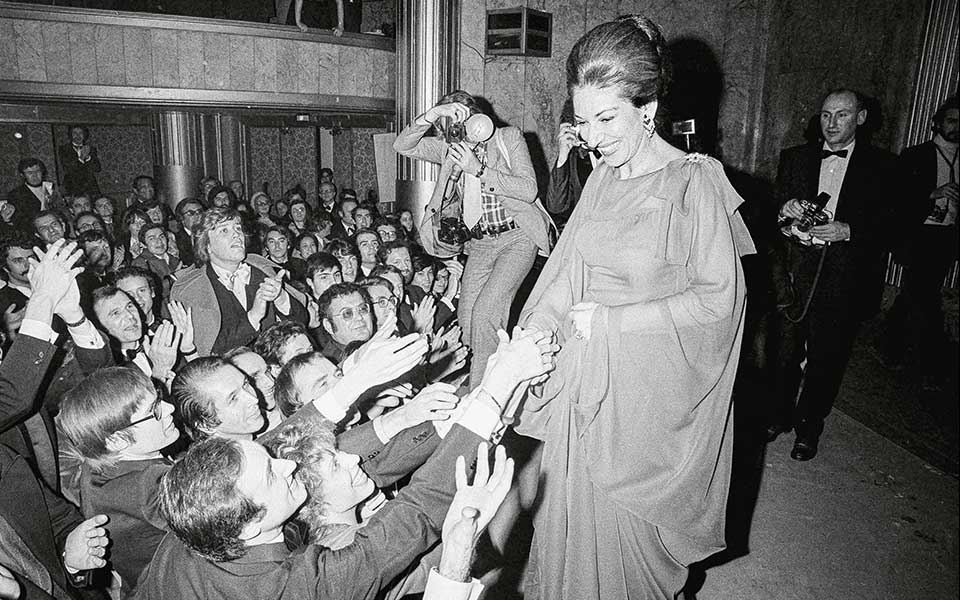In November 1958, Maria Callas starred in Luigi Cherubini’s Medea at the Dallas Civic Opera in Texas, directed by the great Alexis Minotis and designed by the eminent artist Yannis Tsarouchis. Five years earlier, when she performed the role for the first time at the Maggio Musicale Fiorentino festival, not only did she stun audiences with her singing and acting skills, but she also demonstrated how fascinating this long -forgotten 18th-century work truly was.
Born in New York in 1923, the daughter of Greek immigrants, Maria Kalogeropoulou rose to the peak of her artform in the 1950s. The young soprano, whose crystalline voice had already made an impression in Athens during the difficult five-year period between 1940-1945, had now been transformed into Maria Callas, a dazzling woman and artist, a diva with an international career, the embodiment of a “prima donna assoluta” of the 20th century. It seemed like a great romance was the only thing missing from her life, and she soon found it in the person of Aristotle Onassis. Their passionate affair soon made headline news, as both were married to other people at the time – he to Tina Livanou, and she to her Pygmalion, Italian industrialist Giovanni Battista Meneghini, 27 years her senior.
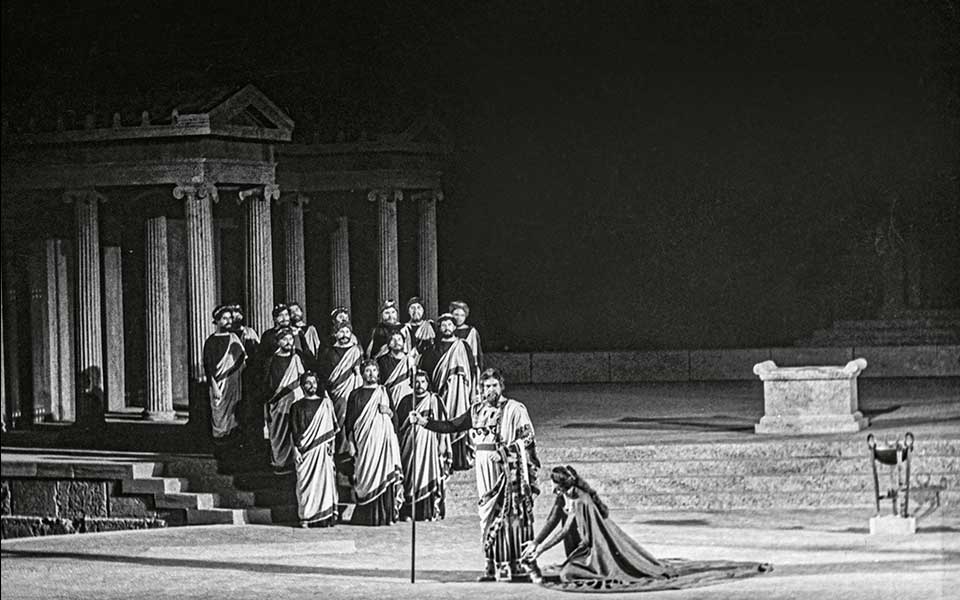
© NIKOS MAVROGENIS, ANTONIS PATSIAVOS/ELIA-MIET PHOTOGRAPHIC ARCHIVES
In November 1959, then director of the Greek National Opera (GNO) Kostis Bastias proposed to Callas that they stage an opera in the ancient theater of Epidaurus for the first time. Their old acquaintance and mutual respect worked its miracle: she accepted, choosing Vincenzo Bellini’s Norma, which was staged under the direction of Minotis, with sets by Tsarouchis and musical direction by her favorite conductor, Tullio Serafin. Callas would perform the central role of the high priestess, a leader of her people who falls in love with the Roman proconsul, and starring beside her would be the young mezzo-soprano Kiki Morfoniou (Adalgisa), Italian tenor Mirto Picchi (Pollione), and Italian bass Ferruccio Mazzoli (Oroveso).
“La Divina,” as she had been nicknamed by the international press, landed at Athens’ Elliniko Airport on August 9th, 1960, her arrival immediately monopolizing the interest of the Greek media, which had begun to report on the long-awaited performance months earlier. At the scheduled press conference, Bastias made it clear that no questions about her private life would be accepted, as she continued to be protective of her privacy, despite the fact that divorce proceedings against Meneghini had been initiated. At one point, however, she stated slyly: “I am happy – make of that what you will.” She also used the opportunity to announce the Maria Callas Scholarship, as she had agreed that her fee – $5,000 for each appearance – would be donated to the GNO to support young Greek opera performers.
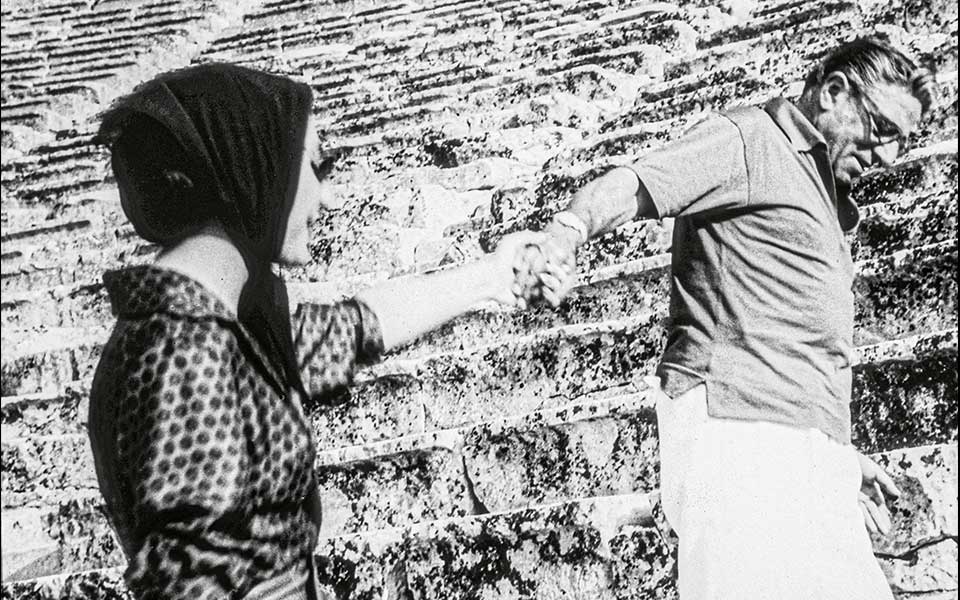
© HULTON ARCHIVE, ARCHIVIO CAMERAPHOTO EPOCHE/GETTY IMAGES/IDEAL IMAGE
Maria at Epidaurus
“When we met her at Asteria [Hotel], she looked nothing like the melancholy and anxious woman that was besieged by the press last summer on Onassis’ yacht. A new Callas has been born,” reported the newspaper Eleftheria. “She was living her love affair with Onassis. He drove her to the theater every afternoon. They’d show up to rehearsal holding hands, he’d sit through the rehearsal and then they’d leave together. You could see that she was happy,” her co-star, Kiki Morfoniou, said in an article in the newspaper Ta Nea.
The preparations at Epidaurus began the day after Callas’ arrival, and they were intensive. As Alexis Minotis later wrote in his book Distant Friendships, the evening rehearsals were not enough for the great singer, so she started going to the ancient theater at 10 a.m. “We wore straw hats because of the sun and spent hours in the theater, where Callas tested her voice and her movements on Tsarouchis’ tilted stage,” the director explained. On the night of the grand opening, Sunday, August 21st, and with the theater completely sold out, a sudden downpour caused the premiere to be cancelled. “C’est une tragédie,” commented Katina Paxinou, the great Greek actress and wife of Minotis, according to radio and television producer and lyricist Giorgos Papastefanou. The audience returned on Wednesday, August 24th, and the stands were packed to capacity, with 14,000 spectators cheering for Callas. “It was a triumph,” said Papastefanou. “Rarely does an actress’ entrance to the stage captivate the audience as much as Callas’ did. It was as if the entire audience submitted to her regal stature, her commanding gait, her monumental stance, her penetrating eyes, the sharp lines of her face, and they hung onto her slightest movement,” wrote Marios Ploritis in the newspaper Eleftheria on August 26th, two days after the historic first performance of Norma. Callas herself, in a letter written before leaving Greece, wrote: “My heart is full of love and pride for my country” (Eleftheria, 30.08.1960).
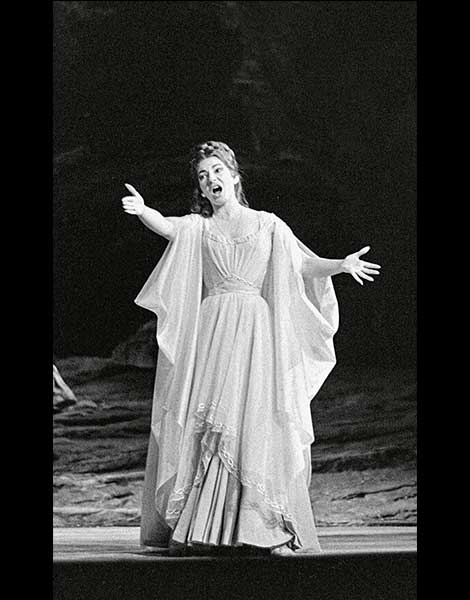
© AFP/VISUALHELLAS.GR
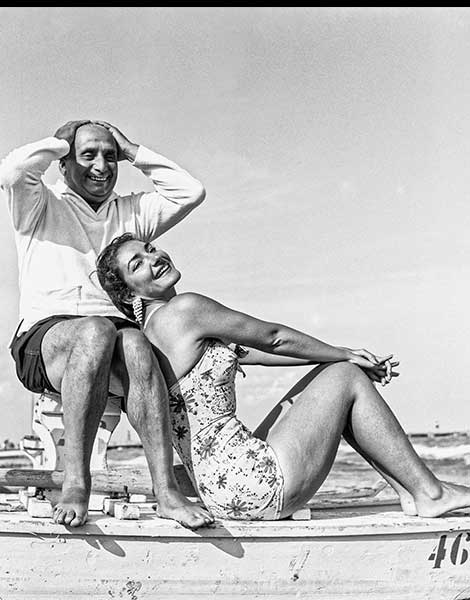
© HULTON ARCHIVE, ARCHIVIO CAMERAPHOTO EPOCHE/GETTY IMAGES/IDEAL IMAGE
Maria Callas returned to the ancient theater of Epidaurus the following summer, for the last time. The GNO set the premiere of Medea for Sunday, August 6th, 1961, with the Greek soprano in the title role, Jon Vickers as Jason, Guiseppe Modesti as Creon and Soula Glantzi as Glauce. Again, Minotis would direct and Tsarouchis would design the set and costumes, while Nicola Rescigno would provide the music direction. Onassis’ luxury yacht, the Christina, sailed into the small harbor of ancient Epidaurus two days before Callas’ appearance, but the tycoon left immediately. He was not going to attend either of the two scheduled performances, on the 6th and the 13th, but newspaper reports suggested that they had been seen walking arm-in-arm in Argostoli, on the Ionian island of Kefalonia, where the yacht briefly docked before setting sail for Epidaurus.
“Fever in Epidaurus as Callas rehearses for Medea,” announced the headline of the newspaper Eleftheria on August 5th. “This year it will not rain in Epidaurus when the great opera singer performs tomorrow and next Sunday, nor will Callas fall ill. This year everything will go smoothly, and the performances of Cherubini’s opera will certainly be a rare delight for the audience and a great artistic achievement for the creators of the production,” reported the newspaper.
Callas rested for a few hours after arriving at Epidaurus and was ready for the costume fittings early in the afternoon. She asked Tsarouchis to make them a little more comfortable and he, pencil in hand, took detailed notes. “Overall, Yannis Tsarouchis’ costume design is beyond reproach. The harmony of colors and shapes conquers eye and heart alike,” Kathimerini newspaper wrote in its review of the production.
The dress rehearsal started at 8 p.m. and the star arrived wearing a dark blue printed dress. “She was in much better form than last year,” commented those in attendance. The entire political, diplomatic, and artistic world was present at the premiere. Sitting next to Kostis Bastias in the front row were the President of Greece, Konstantinos Karamanlis, and his wife Amalia, while other prominent personalities in the audience included politician Georgios Papandreou and the great actress Katina Paxinou.
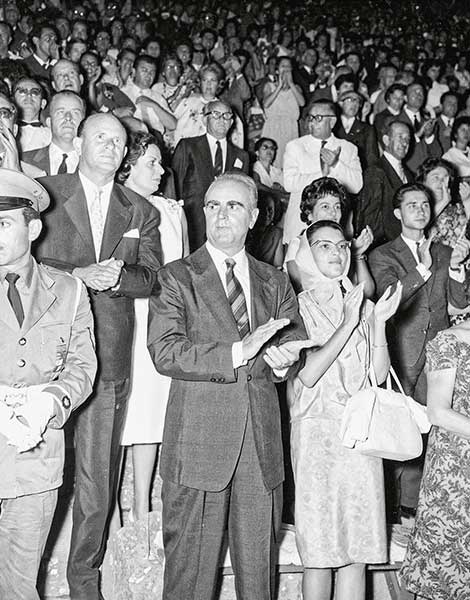
© NIKOS MAVROGENIS, ANTONIS PATSIAVOS/ELIA-MIET PHOTOGRAPHIC ARCHIVES
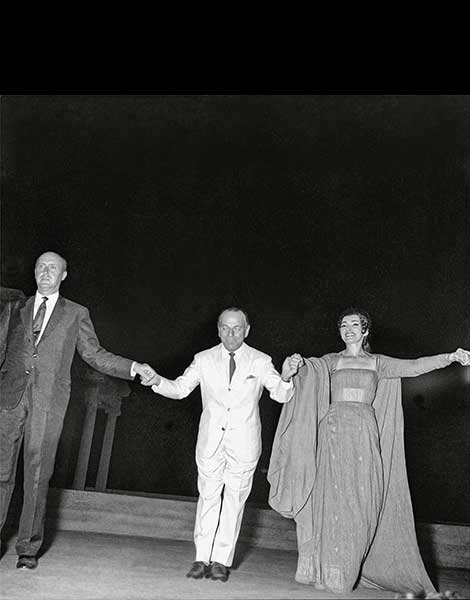
© NIKOS MAVROGENIS, ANTONIS PATSIAVOS/ELIA-MIET PHOTOGRAPHIC ARCHIVES
Writing in Eleftheria about the performance, Marios Ploritis commented that “it is as much a wonder to see Maria Callas as it is to hear her… Yet nothing, perhaps, was more wonderful in her performance than her moments of silence. A lyric singer who captivates without singing […] This, above all others, is Maria Callas’ unique and irreplaceable quality: the fact that she infused the opera with the spiritual and Dionysian quality it lacked.”
Some 15,000 spectators attended the premiere, with everyone talking about the “miracle of Medea at Epidaurus.” The second and final performance on August 13th, was also extremely successful, with journalists estimating the size of the audience at around 17,500, while another 2,000 were turned away after tickets sold out. “In addition to Maria Callas, the director, Mr. Alexis Minotis, and the Greek National Opera singer Ms. Kiki Morfoniou were also warmly applauded,” according to reports.
Callas left on Onassis’ yacht, which sailed to the bay of Glyfada on Athens’ southern coast, where the couple entertained Prince Rainier III of Monaco and his wife, Grace Kelly. A day later, the couples went out for a night on the town at the Spilia social club in Pasalimani. Maria Callas was 38 years old at the time. She had to appear in court later that same year to counter Meneghini’s accusations that she was responsible for the dissolution of their marriage and therefore the divorce should be granted against her. Rumors of plans to marry Onassis also abounded, though that, of course, never happened. A few years later, in 1968, the Greek tycoon had the “wedding of the century” with the former first lady of the United States, Jacqueline Bouvier Kennedy.
As part of this year’s celebration for the 100th anniversary of Maria Callas’ birth, the Greek National Opera will be hosting multiple performances in Athens.
Sources: The book Kostis Bastias, by Ioannis K. Bastias (Kastaniotis Publishing); archival material found with the help of musicologist Sofia Kombotiati, an associate of the GNO Department of Dramaturgy and head of the itsVirtual Educational Museum; as well as the essay “Norma: Her Greek Journey,” by Kombotiati.

